#where are the stories with philosophical undertones?
Explore tagged Tumblr posts
Text
Slamming my hands on the table sobbing about romanticizing zombies
#talking to myself#please I’m so unwell about the undead#vampires get talked about all the time#ghosts too sorta#where are my paranormal romances about living dead people?#where are the stories with philosophical undertones?#god do I have to do everything myself around here?#(kidding. kinda.)#I’m okay and normal (fucking lying)
1 note
·
View note
Text
𝓭𝓪𝓻𝓴 𝓪𝓬𝓪𝓭𝓮𝓶𝓲𝓪 ˙⟡🪶─
𝒃𝒐𝒐𝒌 𝒓𝒆𝒄𝒐𝒎𝒎𝒆𝒏𝒅𝒂𝒕𝒊𝒐𝒏𝒔
Dark academia is rooted in a love for philosophy, history and literature... so here are some recommendations for books that fit the dark academia aesthetic and you should definitely read
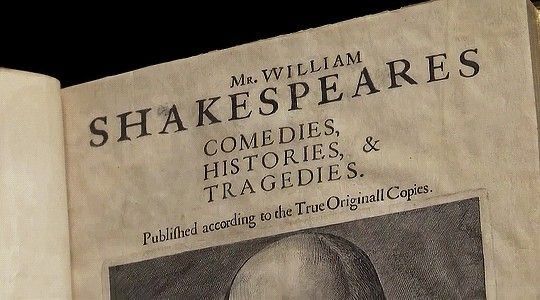
𝒄𝒍𝒂𝒔𝒔𝒊𝒄𝒔
The Secret History by Donna Tartt
The cornerstone of dark academia literature. A group of elite classics students is drawn into a web of obsession, betrayal, and murder.
The Picture of Dorian Gray by Oscar Wilde
A dark exploration of beauty, morality, and corruption in Victorian England.
Frankenstein by Mary Shelley
A Gothic classic delving into the pursuit of forbidden knowledge, ambition, and the consequences of creation.
Jane Eyre by Charlotte Brontë
A story of love, mystery, and self-discovery, set against the brooding backdrop of Thornfield Hall.
Dracula by Bram Stoker
A Gothic masterpiece full of eerie atmospheres, academic investigation, and the dark allure of the unknown.
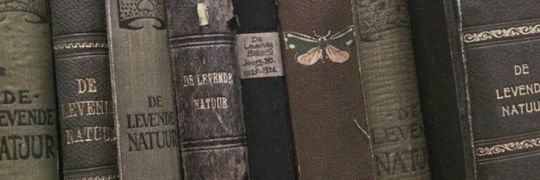
𝒎𝒐𝒅𝒆𝒓𝒏 𝒏𝒐𝒗𝒆𝒍𝒔
If We Were Villains by M.L. Rio
A Shakespearean tragedy set in an elite performing arts college, where students’ lives unravel after a murder.
Vita Nostra by Marina & Sergey Dyachenko
A surreal and unsettling novel about a young woman attending a mysterious school where reality bends under the weight of knowledge.
Bunny by Mona Awad
A darkly humorous and sinister look at creativity, academia, and a cult-like clique in a prestigious MFA program.
The Atlas Six trilogy by Olivie Blake
A magical dark academia tale about six exceptionally talented magicians competing for a place in a secret society that guards knowledge.
In The Dream House by Carmen Maria Machado
A memoir with Gothic undertones that explores trauma, storytelling, and academic reflection.

𝒎𝒚𝒔𝒕𝒆𝒓𝒚/𝒕𝒉𝒓𝒊𝒍𝒍𝒆𝒓 𝒏𝒐𝒗𝒆𝒍𝒔
The Shadow of the Wind by Carlos Ruiz Zafón
A mysterious and haunting tale of a young boy discovering a forgotten book and its dark history.
The Ninth House by Leigh Bardugo
A supernatural dark academia story set in Yale’s secret societies, where magic and danger collide.
Mexican Gothic by Silvia Moreno-Garcia
A chilling Gothic mystery set in a decaying mansion, with a protagonist investigating her cousin's eerie marriage.
The Lying Game by Ruth Ware
A tale of friendship, deceit, and secrets in the shadow of a Gothic boarding school.
Plain Bad Heroines by Emily M. Danforth
A queer, layered story blending Gothic horror and academic intrigue across timelines.

𝒑𝒐𝒆𝒕𝒓𝒚 & 𝒑𝒉𝒊𝒍𝒐𝒔𝒐𝒑𝒉𝒊𝒄𝒂𝒍 𝒘𝒐𝒓𝒌𝒔
The Complete Poems of Emily Dickinson
Dickinson’s introspective and haunting poetry complements the aesthetic’s love of literature and existential reflection.
Meditations by Marcus Aurelius
For the intellectual side of dark academia, this stoic philosophical work is a guide to self-reflection and understanding.
Paradise Lost by John Milton
An epic poem exploring rebellion, ambition, and the fall from grace, perfect for the themes of the aesthetic.
Songs of Innocence and Experience by William Blake
Poetry reflecting duality, beauty, and the darker aspects of human nature.

𝒘𝒊𝒕𝒉 𝒂 𝒎𝒂𝒈𝒊𝒄𝒂𝒍 𝒕𝒘𝒊𝒔𝒕
A Deadly Education by Naomi Novik
A magical school where survival is key, blending dark academia with fantasy and wit.
Jonathan Strange & Mr. Noell by Susanna Clarke
A dense, Gothic tale of magic, rivalry, and ambition in 19th-century England.
The Magicians by Lev Grossman
A modern, darker take on a magical academy, filled with existential musings and flawed characters.
A Discovery of Witches by Deborah Harkness
A historical and fantastical romance steeped in academia, libraries, and ancient mysteries.
Piranesi by Susanna Clarke
A haunting, introspective story set in an otherworldly labyrinth that plays with memory, knowledge, and solitude.

𝒚𝒐𝒖𝒏𝒈 𝒂𝒅𝒖𝒍𝒕
Ace of Spades by Faridah Àbíké-Íyímídé
A suspenseful story of privilege, power, and systemic secrets in an elite private school.
Catherine House by Elisabeth Thomas
A slow-burning, atmospheric novel about an experimental university and the price of knowledge.
We Were Liars by E. Lockhart
A tale of mystery, tragedy, and privilege among a wealthy, secluded family.
The Raven Cycle by Maggie Stiefvater
A series rich with mysticism, academic undertones, and a search for ancient knowledge.
An Enchantment of Ravens by Margaret Rogerson
A romantic and artistic dark fantasy set in a world of fae and forbidden craft.

Did you read any of the books mentioned here? And if so what was your favorite/your opinion on them?
I personally read most of the books here and loved every single one.
-michala♡
#dark academia#dark academia aesthetic#dark academia vibes#dark academia moodboard#dark academia books#book recommendations#must reads#books and poetry#classic literature#young adult books#poetry#philosophical works#dark academic literature#books and libraries
57 notes
·
View notes
Note
I just had the idea of a comic where batman is investigating the joker cause he was quiet for a while and batsy is ~suspicious~ and when he finds him it looks like uho! The joker is dead! But how could it be? Ensue a very serious investigation by batman with an add of tragic obsessive homoerotic undertones!
Meanwhile joker wakes up in hell (bcs ofc he does, hell is fucking canon in the dcu) and suprise! He actually wasn't killed in any epic way, just fucking, idk slipped on a banana peel and died. So joker is like "Nah fuck this. The only acceptable death is to die by my Batsy's hands." And proceeds to just, try to fucking get out of hell (and let him have fun while he's at it).
I kinda want john Constantine to make a cameo bcs I love him
Oh and I want it to be played like a black comedy
This would be a good companion story to Batman: Damned, only it's Joker we follow and it's funny and it's actually good. (And I guess instead of having full frontal nudity that later gets censored, there could first be censored nudity and then in reprints SURPRISE NAKED JOKER.)
But seriously, this is such a great idea that would work perfectly fine in an official comic. We need more Joker hijinks! Nowadays they still seem to happen mostly in comics that are their own universe (eg, One Operation Joker) or in, like, peripheral comics where maybe it's canon or maybe it isn't (eg, Batman/Superman: World's Finest #25). Whereas in the main storyline in Batman, we've got Joker pulled into grim backup personality nonsense with bonus AI art accusations.
We must end the god-mode brilliant Joker era and return to chaotic idiot Joker. It would be fantastic to see him get himself killed in the stupidest way possible, in a huge blow to his ego. The way he's able to fight his way out of hell should be stupid too, not the usual "oh he's impervious because he's the Joker and figured out a way." I was talking to @distort-opia about this, and she had the idea that it should be because Joker's name is already in the book of the dead because he died temporarily in the acid vat, and I said what if it's because he temporarily died so many times that an overworked afterlife auditor just figured he has to be dead and stamped it in. So thanks to bureaucratic confusion, Joker gets to run around looking for a second loophole that gets him back to the land of the living. And yeah, maybe he's just so obnoxious that someone calls Constantine like, "Please get this guy the fuck out of here."
Wait, oh my god. Joker is insistently pleading (haranguing) his case to everyone, going on and on about how Batman created him and they're inextricably linked, and therefore dying at Batman's hand has to be his only possible demise. And at the end, some weary afterlife Account Manager asks, "Okay, then how has this apparently amazing fighter and strategist managed to not kill you before?"
Joker's like, "Oh, that's the best part of our connection. He thinks he has a philosophical and moral obligation to never kill me. Once I'm out of here, who knows when you'd see me again!"
The Account Manager responds, "I see."
A few minutes later the Curses Department is processing a form that says Joker can literally only die if Batman kills him.
95 notes
·
View notes
Text
A short and non exhaustive list of Romantic stories where someone falls in love with a statue:
->Gustavo Adolfo Bécquer:
El beso, (1863) -> set in the napoleonic wars, the story has anti colonial undertones, the statue represents the ancient legacy of Spain about to be desecrated by the invading forces. Can an inertial stone defend itself from the attack? Or is art not innert at all??
Rima LXXVI (1868) a more philosophical take on the same subject
->Théophile Gautier:
Arria Marcella: art nerds travel to Pompeii. The city gives a much livelier impression to those with an artist’s eye, especially the imprint of the thigh of a beautiful woman who died thousands of years ago. Or did she. Because like another of Gautier’s heroes said, no one really dies if someone still loves you
->Honoré de Balzac:
Sarrasine, a sculptor starts treating a person as if they were one of his artworks, he recreates them in sculpture form, but the unwilling model refuses to be what the artist needs them to be. There’s also gangster priests involved because this is a Balzac novella.
->Alexandre Dumas:
The Count of Monte Cristo, during the glorious dawamesc scene, Franz isn’t quite sure of the nature of seductive women he meets. They seem very much alive, but after the trip he sees some suspiciously similar statues he hadn’t noticed before.
Vingt and après: I will let Athos explain: “(…) just at his age, how deep in love I was with a Grecian statue which our good king, then Henry IV., gave my father, insomuch that I was mad with grief when they told me that the story of Pygmalion was nothing but a fable."”
->Petrus Borel:
Mme Putiphar, an apparently benevolent and Enlightened jailer has some cozy tête-à-têtes with a bust of Ninon, in finding a female prisoner of flesh and blood, the marble bust in the fortress ceases to be his predilect female presence
-> ETA Hoffmann:
The Sandman (the famous Coppelia, is not really a statue but an automaton… the illusion of life/appeal is in the motion of the doll)
-> Victor Hugo: Grantaire calling Enjolras «��quel beau marble »
#romanticism#romantic literature#book lists#untill reading becquer today I thought this was a french lit thing#there’s a name for this aka algamathophilia#I honestly gind it very intriguing#the idea was to post links for each story but some aren’t translated…#the athos example is intriguing bc the statue isn’t gendered in the translation… should check the french text#more examples are welcome. this is a very intriguing subject to me >_>
18 notes
·
View notes
Text
Trope chats: immortality

The concept of immortality has fascinated humankind for millennia, often appearing in myths, folklore, religious texts, and modern literature. It evokes existential questions about the nature of life, death, and time, while exploring what it means to be human. As a literary device, immortality serves as a lens through which authors explore morality, purpose, and human frailty. However, it also comes with narrative risks, including the potential for repetitiveness or a lack of emotional stakes. Beyond literature, the immortality trope also plays a significant role in shaping societal beliefs, fears, and aspirations. This essay delves into the uses, pitfalls, and broader societal impact of the immortality trope, highlighting its continued relevance and complexity in storytelling.
The origins of the immortality trope can be traced back to ancient myths and religious stories. In the Epic of Gilgamesh, one of the oldest recorded works of literature, the hero seeks immortality after confronting the inevitability of death following the loss of his friend, Enkidu. His journey highlights the futility of escaping death, yet simultaneously reflects the enduring human desire to transcend it.
Similarly, in Greek mythology, figures like Tithonus and the gods themselves embody different aspects of immortality. Tithonus, granted immortality without eternal youth, serves as a cautionary tale about the consequences of living forever but decaying in body. The gods’ immortality, on the other hand, emphasizes their divine nature and separateness from the human condition. Immortality in these tales often reflects not just a desire for eternal life but a deeper exploration of what it means to live and die well, and how immortality complicates those values.
In many religious traditions, immortality is also connected to the afterlife. Christianity, Islam, and Buddhism each promise a form of life beyond death, whether it is eternal paradise, reincarnation, or enlightenment. The religious portrayal of immortality often carries moral undertones, where eternal life is a reward for virtuous living. Here, immortality is not inherently desirable but conditional, serving as both an incentive for moral behavior and a reflection of divine justice.
As literature evolved, the immortality trope took on new dimensions. In modern fiction, immortality is often examined through the lens of individual psychology, ethics, and social dynamics. The vampire genre, popularized by Bram Stoker's Dracula and modernized by works like Anne Rice's The Vampire Chronicles, explores the existential burden of living forever. Vampires, often cursed with immortality, grapple with isolation, moral decay, and ennui. In these stories, immortality becomes a prison rather than a gift, highlighting the human need for connection, change, and mortality.
More recently, works like Kazuo Ishiguro’s Never Let Me Go and The Age of Adaline reframe the immortality theme within the context of scientific advancement and human experimentation. These narratives question the ethical boundaries of life extension and the implications of such technological progress. For instance, in Never Let Me Go, the cloned characters are treated as vessels for immortality by others, emphasizing the dehumanizing consequences of pursuing eternal life through unethical means.
In speculative fiction, Ray Bradbury’s The Martian Chronicles and Isaac Asimov’s Foundation series engage with the idea of immortal civilizations or entities. These works extend the immortality theme beyond individuals, questioning whether societies and cultures themselves can achieve a kind of immortality through knowledge, science, or colonization of new worlds.
The immortality trope allows for the exploration of a wide array of philosophical and emotional themes, making it a powerful tool for authors. Key among these are the notions of time, identity, and morality.
Immortal characters often experience time in profoundly different ways than mortal beings, leading to a disconnection from human concerns. In works like Tolkien’s The Lord of the Rings, the Elves, who are immortal, possess a deep historical memory and an inherent melancholy, as they witness the rise and fall of kingdoms and people. Their immortality gives them a different perspective on war, love, and life itself, where events that seem monumental to mortals are but fleeting moments in their endless existence.
Immortality raises questions about personal identity over time. How does an individual maintain their sense of self over centuries or millennia? In works like Virginia Woolf’s Orlando, the protagonist’s immortality and gender fluidity are intertwined, allowing Woolf to explore the fluidity of identity over time and space. In contrast, works like The Picture of Dorian Gray by Oscar Wilde show the dangers of eternal youth, where a refusal to change or grow leads to moral and psychological decay.
Immortality often complicates ethical decision-making. Characters who cannot die may become indifferent to the suffering of others, seeing human life as transient and insignificant. This is evident in characters like Doctor Manhattan from Alan Moore’s Watchmen, whose near-omniscience and immortality alienate him from humanity, as he struggles to find meaning in life and morality. Alternatively, immortal characters might strive to use their endless time for benevolent purposes, as seen with Captain Jack Harkness in Doctor Who, who serves as a protector despite the pain his immortality causes him.
Despite its narrative potential, the immortality trope has several pitfalls. One of the major risks is that of repetitiveness. Immortal characters, particularly those in long-running series, may struggle to evolve in meaningful ways, since their inability to die removes traditional narrative stakes. This can lead to stagnant character arcs, where the potential for growth and change is limited by the character’s inherent invulnerability.
Another challenge is diminished emotional engagement. Mortality is central to the human condition, and much of a reader’s emotional investment comes from the awareness that a character's time is limited. In stories featuring immortality, the absence of death as a real possibility can lessen tension. Authors must compensate for this by introducing alternative stakes, such as the potential for emotional or existential suffering, as seen in Interview with the Vampire, where the emotional isolation of eternal life becomes the central conflict.
Lastly, immortality can sometimes lead to philosophical overload, where stories become bogged down by metaphysical debates and lose touch with the characters themselves. When immortality is used merely as a plot device for abstract musings on existence, it risks alienating readers who are more invested in narrative progression or character development.
The immortality trope also resonates beyond literature, reflecting broader societal anxieties and desires. In an age where scientific advancements, such as stem cell research, anti-aging technology, and the quest for digital consciousness, promise the possibility of extending human life, the trope takes on new relevance. It serves as a platform to explore the ethical, philosophical, and emotional consequences of such pursuits.
The immortality trope taps into the human fear of death and the desire to leave a lasting legacy. Whether through biological immortality or cultural immortality (such as leaving behind great works of art or knowledge), many people seek ways to outlive their finite lifespans. This desire for legacy is mirrored in characters who either embrace or reject their immortality, providing readers with a lens to examine their own fears of mortality.
Immortality also reflects societal aspirations toward technological progress. With the rise of biohacking, life extension research, and transhumanist movements, immortality is no longer a distant fantasy but a potential reality. However, stories that explore these themes often serve as cautionary tales, warning against the ethical and psychological consequences of altering the human condition. Works like Altered Carbon highlight the dangers of living indefinitely through technological means, from economic inequality to the erosion of empathy and identity.
In today’s society, the immortality trope intersects with cultural obsessions with youth and beauty. The growing industries dedicated to anti-aging products, cosmetic surgery, and longevity diets reflect a deep-seated fear of aging. Stories that feature eternal youth, such as The Picture of Dorian Gray, expose the vanity and moral emptiness that can accompany such obsessions, warning of the costs that come with an eternal pursuit of youth.
The immortality trope, deeply rooted in human mythology, religion, and literature, remains a powerful tool for exploring existential questions about life, death, and the passage of time. While it offers unique opportunities for examining morality, identity, and the human condition, it also presents narrative challenges, such as the risk of stagnation or diminished emotional stakes. Beyond its literary uses, the immortality trope continues to influence and reflect societal aspirations, fears, and ethical concerns, particularly in the context of modern science and technology. In a world where the possibility of extended life may one day become a reality, the trope of immortality will remain a vital means of grappling with the profound questions that define the human experience.
#writeblr#writers of tumblr#bookish#writing#booklr#fantasy books#book blog#creative writing#ya fantasy books#ya books#fiction writing#how to write#am writing#fantasy writer#female writers#story writing#teen writer#tumblr writers#tumblr writing community#writblr#writer problems#writer stuff#writerblr#writers#writers corner#writers community#writers life#writers on tumblr#writerscommunity#writerscorner
18 notes
·
View notes
Text
for @slutsons-blog 💖
I'll explain the genesis of this post in case anyone else is interested!
The frame of reference of the post is basically the way I see Cas from s6 unitl 15x18 which I guess you haven't watched yet? But you're on this website so I must presume you know what happens in that episode, right? It's the episode where Cas says this:
I always wondered, ever since I took that burden, that curse, I wondered what it could be? What my true happiness could even look like. I never found an answer because the one thing I want… It's something I know I can't have. But I think I know… I think I know now. Happiness isn't in the having, it's in just being. It's in just saying it.
I'm not denying the pathos of the moment and its poetry and I understand its importance in the wrapping up of Castiel's arc for s15. However, I personally have huge problems with this way of thinking about happiness. If I put my thinking cap on I'm very suspicious of that equivalence where happiness = not having = just being = just saying. I find it profoundly false and purposely vague which makes it more interesting to analyze.
Then there's the notion of "true happiness" which always makes my ears perk up because, you know, "truth" is a super loaded topic and combined with that of "happiness" you might as well have the recipe for a philosophical bomb in your hands.
What this little declaration sounds to me is very dangerously close to the famous "happiness real only when shared", the annotation that Christopher McCandless wrote next to a passage from the novel "Doctor Zhivago", a story also about a difficult love between two people that ultimately ends in death. The passage was the following:
And so it turned out that only a life similar to the life of those around us, merging with it without a ripple, is genuine life, and that an unshared happiness is not happiness, so that duck and vodka, when they seem to be the only ones in town, are not even duck and vodka. And this was most vexing of all.
I haven't read the novel so I couldn't really speak about it but it seems to me that its political aspect shouldn't be ignored given that Boris Pasternak was faced with the threat of exile by the Communist Party (among other things) upon news of being the recipient of the Nobel Prize for that specific novel.
In this light the collectivist dream of "merging without a ripple" has some serious ominous undertones, therefore "happiness" in that passage might (or might not, again I haven't read the book, I just know of its context) as well be equivalent to omologation and comformity.
Now, of course, while I don't know and forever won't know what McCandless took from that passage that made him write the "happiness real only when shared" famous annotation, I do know that in mainstream culture this has come to mean, that is that the only real, or I might just say "true", happiness is when you share life with other people or when, I might just say, you reveal your feelings to other people. Which still hasn't solved my issue: what does true/real happiness mean? what do "real" and "true" mean and how do these adjectives affect "happiness" and decide when it's real/true and when it's not? And, finally, who dictates what reality and truth are? It seems to me that the answer to the question has just been shifted but not resolved.
And I think it's not resolved because we keep imagining our society as based on lack, on the things we can't have and never will which is a phallogocentric view of the world.
This is where the "lacanian supernatural" idea of my post comes from. If you wanna explore the inner workings of my brain, more below.
I'll try to be brief which means I'll have to oversimplifly lots of stuff which means this stuff will not be properly contextualized but these French philosophers/psychoanalysts talked.and.wrote.A.LOT. and then they modified their views during the years and also it's been 7 years since I'm done with them so it is what it is, that is I hope it'll make sense.
Basically Lacan revisited Freud's works and posited that the real trauma for people is not literally related to sex but, more symbolically, to language. He used Freud's Oedipal complex to express that the paternal function doesn't mean an actual fear of castration but it's the function that imposes the Law and defines what can be desired and attained and what cannot. For Lacan, it's not about the anatomical penis, but about the "phallus" which is a symbolic signifier of lack and sexual difference. To put it bluntly, the lacanian father(s, there are actually three fathers but let's not go there for now) is what comes between the child and the mother and tells the child: you are not your mother (but "I am your father" hahahah lol little joke), in this way he makes the child desire to go back to being one with the mother and makes the child enter the world of language which is the world of the "Law" (life like it is established to be lived: norms, social relations, kinship relations etc).
Now we have a problem Houston 'cause yes, castration is not literal, cool, but it's still something that happens. According to Lacan what gets castrated is the "jouissance": the lack of jouissance is what constitutes the subject. Now, what is this jouissance, you may ask? Well, it can't be translated into English. It can be translated as "enjoyment" altough you might want to bear in mind that "jouir" in French also means "to have an orgasm", just fyi.
Here Lacan expanded on Freud's "pleasure principle" because he differentiated between "plaisir" (pleasure) and "jouissance". "Plaisir" still obeys Freud's "pleasure principle" (everything we do, we do it to obtain pleasure and avoid unpleasure) while "jouissance" is trangressive because it goes "beyond the pleasure principle". According to Freud beyond this fucking principle there's only death: in other words humans tend towards death (the death drives). "Jouissance" is therefore both enjoyment and the road to death.
In Lacan's view "jouissance" cannot be experienced because the world is ruled by the symbolic signifier of the phallus which dictates a life based on lack as per above. For Lacan jouissance cannot be reached even by sex, the jouissance in sex is just a fantasy related to body parts. Now don't ask me why but later in life Lacan started to rethink some of the stuff he said and basically he started saying that there is an "other jouissance*", which is a "feminine jouissance" that can be experienced because it's a jouissance of the body that is "beyond the phallus" (which to me seems a total contradiction of his other points but okay, I guess), but which is nevertheless an "étrange" meaning "strange" jouissance. From this "étrange" stuff he went on to play on the word as "être-ange", meaning to be an angel, to talk about asexual jouissance.
*This concept of the "other jouissance" was then used by some French feminists, notably Cixous, to describe women's sexual pleasure and, more broadly, women's ability to create and be creative (as I said I'm oversimplifying so don't come at me tumblr academics). So no more death drive talks people, this is about creation and joy and pleasure beyond the phallus.
Finally, I want to say that I don't agree with almost anything of the above, but it's still interesting to read stuff through lacanian lenses cause some of his takes are like a trip or something hahahah. Quite a few philosophers have criticized Lacan, namely Derrida because they were like: dude, even if it's not the real thing you're basing everything on the phallus, are you okay? 'Cause, like, as you can see Lacan's central idea is the "phallus" that, anatomical or not, still gives meaning to everything. This is what Derrida calls "phallogocentrism" (the centering on the phallus + logos) i.e. the Western tendency to privilege language and the masculine point of view to create and shape discourses. Other philosophers like Deleuze and Guattari in "Anti-Oedipus: Capitalism and Schizophrenia" have criticized Lacan because his theories were based on a concept of desire as lack while for them desire is very much active, present and an affirmative vital force. They have also criticized the idea of the Other (which in Lacan is the mother but, again, there technically are three mothers but, as I've said, we won't go there) as the negative difference through which the norm (the Law) is established and have advanced the notion of positive difference, aka an Other that's not a minus compared to the Law.
And this is what I meant when I wrote in the tag that Berens is my enemy because saying that happiness is in "just saying it" means that what's important is the language and the word and that's it's okay to want and not having because desire is lack and like, no dude, not at all.
Sooooooooooooo. Are you still there?
I will proceed to translate my post now LOL.
in the lacanian (= a world founded on the phallus, therefore on lack and where desire is unattainable) supernatural that damingingly lives in my head (as you can see) the one thing castiel wants and he knows he can't have is the other jouissance (women's sexual pleasure and ability to create) but he can't have it because the narrative forces him back into his incorporeal être-ange role (an angel who has no sex and no body and cannot therefore experience other jouissance) while he pretty much wants to have a body and, dare i say, suffers from a little bit of womb envy (just my headcanon that does have some solid proof because Castiel is very closely associated with mothers, births, portals, rifts and children) because that angel doesn't have a death drive but a birth drive (as I said, he doesn't want to die, he actually wants to give birth and create but the narrative, which is lacanian, says no, you can't have that so RIP, see you in your next resurrection and, btw, from s6 you're obvi also gonna be a neurotic, good luck babe!)
Wow, this was a very, very convoluted way of saying transmasc cas rights but yeah.
#i have no idea of what i've written but i hope it makes sense#honestly don't know how to tag this#😂😂😂#spn 15x18#i guess?#truth and despair etc etc#super-m/Others#myths we live by
6 notes
·
View notes
Text
Top 10 Japanese Horror Movies

Japanese horror, or J-horror, is renowned for its unique storytelling, psychological depth, and unsettling imagery. Here are ten significant films that have shaped the genre:
Ringu (1998) Directed by Hideo Nakata, Ringu is a cornerstone of Japanese horror that popularized the genre internationally. The film revolves around a cursed videotape that leads to the viewer's death seven days after watching it. Its slow-building tension and psychological horror make it a standout, avoiding reliance on jump scares.
Ju-on: The Grudge (2002) This film by Takashi Shimizu tells the story of a cursed house in suburban Tokyo, where a vengeful spirit haunts anyone who enters. The narrative is structured through multiple interwoven stories, enhancing its eerie atmosphere. The haunting sounds and visuals contribute significantly to its unsettling impact.
Audition (1999) Directed by Takashi Miike, Audition begins as a seemingly benign romantic tale but quickly descends into horror. A widower holds auditions for a new wife, leading to a chilling relationship with a mysterious woman. The film is known for its shocking finale and exploration of obsession and manipulation.
Noroi: The Curse (2005) Presented in a found-footage style, Noroi follows paranormal investigator Kobayashi as he uncovers a series of strange occurrences linked to an ancient curse. Its slow-burn approach builds a pervasive sense of dread without relying on conventional scare tactics[.
Dark Water (2002) Also directed by Hideo Nakata, this film tells the story of a mother and daughter who move into a dilapidated apartment haunted by supernatural occurrences. The film's themes of loss and maternal anxiety are intertwined with its horror elements, creating an emotionally resonant experience.
Uzumaki (2000) Based on Junji Ito's manga, Uzumaki explores the terrifying obsession of a town with spirals. As residents become increasingly affected by this phenomenon, the film delves into themes of madness and existential dread, showcasing Ito's unique horror aesthetic.
Pulse (Kairo) (2001) Directed by Kiyoshi Kurosawa, Pulse tackles themes of isolation in the digital age as it depicts spirits attempting to invade the human world through technology. Its atmospheric tension and philosophical undertones set it apart from typical horror films.
Kwaidan (1964) An anthology film directed by Masaki Kobayashi, Kwaidan presents four ghost stories rooted in Japanese folklore. Each segment is visually stunning and narratively rich, making it an essential piece of Japanese cinema that transcends traditional horror.
Spiral (Uzumaki) (2000) Similar to Uzumaki, this film explores the psychological effects of spirals on its characters in a cursed town. The narrative combines surrealism with horror as it illustrates how obsession can lead to madness.
Battle Royale (2000) While not strictly horror in the supernatural sense, this film directed by Kinji Fukasaku presents a dystopian scenario where students are forced to kill each other in a government-sanctioned game. Its commentary on society and human nature places it within the broader context of horror cinema.
5 notes
·
View notes
Text
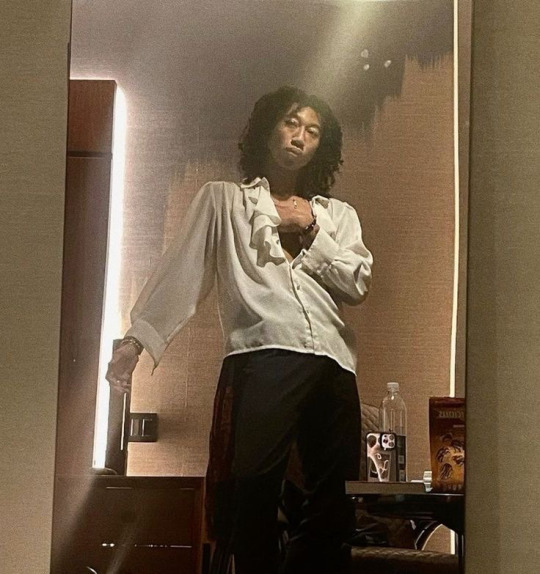


༅ 𝒞irce 𝒴ué'li 𐙚 ˙

♱ all sobriquets + pseudonyms. ࿓ fang, master yuè’li, sir, sir circe, sir yuè’li, pup, puppy, circe love, circe dear, rubber bird, latex predator, leathered bird, (that fucking) raven, circo, mr.circo, circe sir, freaky fang, freaky fuck, chupacabra, hijo chupa, circe, master, lean and lovely, my string(s), selenite scholar, smart ass, sandalphon, bread and butter, cutie or clementine, philosopher friend, big guy, count yue'li, tall curled and handsome, perrito, any subtle positive adjective, circe, blind bat, weirdo, fucking weirdo, garlic breath, werewolf, (my) garlic knot (from neso <3), the werewolf, kitty litter, the guitar playing asanbosam, mr. lee, lee sir, crazy, the asanbosam, handsome, mr. munka-munka, trenchie, trench coat, renfield, you, bloody mary, beauty or beast, ma'am.
ᰍ overall notables. plays an electric guitar (named it delune). has a bloodhound named babydoll and a doberman named yìzé. works as a part-time music teacher for 2nd - 3rd graders, but recently started going to school for a career in interior design. asanbosam’s (the type of vampire he is) are more agile in trees and high places, so he’s kind of clumsy otherwise. often recommends products (notably the brand anzhong, originated by xīn’yuè ànzhōng), random organization tips, or even seasonings. considers calling off of work a lot, though he knows if he does they’re bound to fire him “this time”. circe also doesn’t socialize too much, and he’s very territorial about his home (and so is yìzé— wonder where he gets that from). he’s a little too territorial actually, seeing as circe usually sucks the blood of/eats any trespassers that ignore his precaution signs, in au’s that are mythical allowing. he does so by jumping down from a nearby tree and pinning them. (even friends get tackled if they don’t give him a heads up that they’re on the way!) ᰍ standard physical facts. 6'3. retractable wings with a 20 foot span, which are black and grey with red, pink and silver undertones, and retractable iron hooks for feet. tips of his hair turn auburn when he’s experiencing intense emotions. always smells like anzhong products- particularly colognes. has a chinese tattoo on his inner forearm that translates to damu héxián qín. his nails are painted black, but they get chipped easily because he’s really hands-on daily. lastly, he has a deep, relaxed and very distinctive voice which can be heard here!
დ genshin au notables! he’s spoken of in legends and campfire stories, but as “fang” rather than circe. legends speak of him hooking his prey from treetops and consuming them like he’s the devil herself. however, as of now this is more of a myth. he’s a clean eater, hehe. these stories originated from a period of his past where he had no control of his primal instincts, leaving him to appear as a beastly night terror to all, which he was. presently, he dwells in a custom built cottage in the forest of sumeru, peacefully enjoying his solitude and pleasures. circe has various signs throughout the terrain which warn people of trespassing; company isn’t appreciated in excess. trespassers in the forest rarely come back out alive. not many others live nearby, either. his only neighbors are xipe’va, whom his bloodhound enjoys relaxing with on the porch (his doberman, not so much). tighnari and love, who’s a minor oc of neso’s, are somewhat nearby though, performing their forest ranger duties and such, so he hangs with them now and again. he’s also good friends with jihane, whom lives in sumeru city and often discusses philosophy with him. oh, and his two boyfriends, indigo and xīn’yuè, live in liyue and inazuma respectively.
დ spider-verse au notables! n/a (temporarily).
დ studio ghibli au notables! his position here depends on the movie, so i won't describe each one here, as it's not all definitive due to my experimental nature. he'll more than likely be written in tales from earthsea, the wind rises, howl's moving castle, and my neighbor totoro.
დ modern au notables! he’s currently going to school at a local trade school in california. he lives in xīn’yuè’s penthouse with him and indigo, as well as blumei, maju, babydoll, yìzé, and (once in a while) yúyīn. he sleeps in with indigo whenever he can and enjoys quiet mornings where the girls are at school, the dogs don’t have any zoomies, and everything from the cleanliness of him and the house to the smell of his coffee is just right. however, xīn’yuè is always forcing him to go to work, scolding his lethargy and indigo’s encouragement of it. luckily, no one has to remind circe to be on time for his interior designing classes, as he’s genuinely passionate about it. since he’s not a vampire here, and instead just has traits that resemble a vampire, circe enjoys halloween and spooky themes. he also bites his lovers when bored, was naturally born with his canines being pointer than usual, and is scarily skilled at climbing and maneuvering on the monkey bars or climbing trees. he loves evening/night walks, partially because his skin is still sensitive to excessive heat. the california sun will provoke an eczema-like condition just like in mythical au’s but to a normal extent. he’d rather get caught in the fricking rain.
დ jujutsu kaisen au notables! n/a (temporarily).
ᰍ age appearance. twenty-five (25). ᰍ birthday. may 9th. ᰍ nationality, race, + ethnicity. (varies per au), asanbosam, + senegalese and chinese. ᰍ gender, prns, + sexuality. male (amab), he/him, + omnisexual.
ᰍ sun sign. taurus. ᰍ MBTI. istp-a, the assertive virtuoso.
ᰍ likes. his electric guitar (delune— yes, he named her); playing the guitar is considered his biggest hobby, adoration and talent. his old doberman, yìzé, and his bloodhound babydoll. his cottage. alone time. blood oranges. ironically, loves garlic bread + garlic based dishes (especially pasta). scaring trespassers, or making his friends jump with jump-scares and shoulder-taps for a good laugh. coal black, wine red, and sometimes pink! strawberry icecream. philosophy and sacred music, especially within the selenian race. feminism. boots. silver jewelry. having his hands in aesthetically pleasing positions (pockets, behind his head while laying down,arms crossed, etc). anzhong products. people who use manners. sweethearts, but especially male sweeties (he just wants to pinch their cheeks ugh). MOTHAFUCKING INDIGO and MOTHAFUCKING XĪN! ᰍ dislikes. random space invaders/leeches. too many home guests (or any really). yellow. stalkers/yanderes/yandere-coded people (specifically when targeted at him). pushy people. paranoia, pessimism + assumptions. difficult/slow learners (as a music teacher he struggles with younger kids that don’t process so easily). jellies and jams. the taste of vanilla. misogyny and misandry. bad hair days. getting stuff under his nails, especially when freshly done. vengeance, gossip + untrustworthiness. cooking for people, especially when there’s a lot of em’— no, even worse if they’re too picky.. bicycling. hot, summer days. being caught in the rain without a stylish umbrella. loud noises. dogs that bark too much. explaining/over-explaining himself.
・゚゚❥ quotes.
After It Rains ୨୧ “Jeez, what a mud bath. *Looks at his dogs.* Glad you two are out of your piglet puppy days heh heh. Guys? *Theyre walking away from him and he’s holding back laughter.* Was it something I said? Come ahhnn! I’m saying you liked the mud!”
About Jihane ୨୧ “The last time we spoke she foretold that my aura was yellow indefinitely. She was wrong. .. It’s red. *Looks off at something in the distance and pauses.* I’m not delusional.”
About Circe: Signature Dish ୨୧ “Nah. That’s a myth, just a little misconception. I use garlic in a lot of my dishes, especially pasta. The best kind I’ve tried thus far? Cherub Sin, easily. It’s a faultless dish. I personally believe the best noodle for any garlic and parmesan pasta is angel hair, and that dish recognizes it perfectly.”
Good Night ୨୧ “Hm.. Remember the night routine I showed you. Ice. Your. Face. Top priority, right? Alright then, and I bid you goodnight. *Nods off salute-like with two fingers and walks away.*”
oc masterlist. extended details. visualizer. character ai.

⑅ leman productions. all rights fucking reserved, do not plagiarize.
#immortal oc#immortal x mortal#vampire oc#vampire original character#vampire x reader#vampire x human#monster oc x reader#monster oc#monster x reader#oc#ocs#my ocs#original character#oc blog#oc concept#oc original character#oc content#oc headcanons#male original character#original writing#creative writing#male oc x reader#monster#oc x reader#genshin oc#genshin original character#oc x oc#original oc#male oc#oc x y/n
15 notes
·
View notes
Text

Finally finished "The Mountain in the Sea" by Ray Naylor
I... I'll be honest, I had misgivings about this book from the first few chapters. The world-building was vague and scattered, the science-fiction of the world wasn't as technical or explained as I normally like my sci-fi, the drama was very slow burn, the switching perspectives of characters sometimes felt a little choppy, and some of the chapters felt a touch short, and some of the jumps between chapters felt lurchy and inorganic.
What I *thought* I was getting into (a merging of eldritch horror and sci-fi) turned out to be a rather philosophical look at the concepts of society, communication, and the struggle between humanity and the "natural world". It was engrossing when it explored these concepts with more nuance and dialog, but a few of the monologuing segments where a little too "bat meet head" about the themes and the characters' assigned philosophical standing on them. Still, that element is where the writing and story thrive.
Finally, as is so often the case, the ending kind of flies in kind of suddenly, and what felt like a Crash-esque collision of these separate stories becomes an almost Goodkind-esque "good guys win cause good guys" that pays too little respect to the tragedy inherent in the story or the dystopian undertones.
Overall, while I didn't get my tentacle monsters or eldritch horror, I did enjoy the book.
2 notes
·
View notes
Note
You keep throwing me the most fascinating curve balls darling. I ask for names and you give me philosophical undertones...? My my, the mind that you have...
My darling - the day is growing near and I have so much work to do, but I want you to know that I'm thinking of you!
Have you any thoughts on where our story is going - based on what you've said so far? (Do you even remember :D)
-S
I'm lost in the sauce - I'll just happy to receive anything from your creative brain!
#acotar gift exchange#necie's first christmas#secret santa 2024#azriel#eris vanserra#azris#acotar gift exchange 2024#acotar#azris supremacy#a court of thorns and roses
2 notes
·
View notes
Note
I think you're the kindest sweetest most imaginative soul I know! I love your little universe and the fact that you've been with it for so long is so wholesome!! I love the different blogs you have and I would love to understand Anuli more! Fae are absolutely adorable and I relate to faer philosophy so like please I will absolutely fan around your finished WIP :D
ALSO the fae pronouns are so creative and it adds on to the magical finding yourself undertones of The Land of the Fallen Fairies! I love them a lot
- Anonymous ;D


THAT MEANS SO MUCH TO ME THANK YOU SO MUCH <3
(I don't know how to communicate how I stop and smile at each and every ask. How it makes my nights of worrying and frantic rewrites, hoping to the stars that this turns out nice. How it casts my internal world, the majority of myself that honestly is my sanctuary in such a wonderous way that I loose any words to express that feeling.
But I can say thank you.
So thank you. It's absolutely wonderous,)
And as for Anuli:
Anuli character sheet <- Basic info and little fun facts
'How did Anuli come to be?' <-- Original character sheets and general LotFF iterations
Lot's of info on Human AU's, Anuli and Kamari, and a philosophical infodump <--- has some more 'philosophical' Anuli info
General tag
ANNNDDD: @imjusthereforeternity
Anuli in general was supposed to be a character that is (a) easy for me to write - so not a ton of actions and as many thought processes as I can get - and (b) represents that need to chase happiness, to fix yourself so you deserve that happy ending.
And part of that is because of stories themselves.
Little me trying to navigate a world they didn't understand found that stories were... not a perfect framework, but by stars did they help. How to be funny. How people think. And most importantly, WHY. Why any of it works the way it does.
And yet, both stories, and the entire universe, told me that 'good things happen to good people'. That those who have a certain attitude, that those who believe certain things or have a certain lifestyle or go through a certain arc will have that whimsical happy ending I wanted so bad, it hurt.
Anuli was my companion, in every time I cycled over to the beginning, throughout all of it. It got to the point where I would accidently call myself 'Anuli' in my head because at times, when I needed a coping mechanism, life was simply story fodder.
... That was a slightly unrelated rant.
Anywho! Anuli's philosophy and internal dynamics.
Anuli does not remember faer tree, or being tethered. Just that fae has been tethered, for as long as fae could remember.
(This is definitely not because I didn't want to write these parts because it was boring in previous iterations... totally not. /j)
But at least fae had stories. Stories, and Kamari. The Place of Tethers may be a villain out to get faer. It may have bright captured stars that scream throughout the night in static, but Anuli has stories. Fae has Kamari. Anuli would have a happy ending someday, because of Kamari. Kamari promised. Fae promised.
And Anuli had glimpses of the happy ending already. Fae knew what it would be like, for fae had already felt that sort of elation. All fae needed was for faer tether to be broken, for the Place of Tethers to be vanquished forevermore.
And Kamari promised. Anuli had Kamari, so it would be okay. The Place of Tethers was bearable because Kamari was there.
...
So anywho, Kamari disappeared for a day.
(I'm probably going to fix bits and pieces of this draft, since it's the first thing I've written for this iteration, and it was difficult for perfectionistic me. Kamari probably told Anuli that fae may be gone for longer and Anuli would get distracted in preparing a story to tell Kamari that fae forgot that Kamari wouldn't be there.)
And Anuli ended up breaking faer tether.
Great!
Fae defeated the antagonist. The Place of Tethers was gone. They had a happy ending now! Kamari would be ecstatic.
Kamari was not, ecstatic.
All this is to say that Anuli had a happy ending before, and fae didn't truly enjoy it because fae thought it might get better.
Then fae ruined it.
And fae's been chasing that happy ending, what fae had before, what fae could've had if fae had just waited, if fae wasn't a fallen fairy, ever since.
This is that sort of 'I CAN FIX ME' that Anuli runs by.
Villains don't get happy endings unless they have redemption arcs. If Anuli had a redemption arc, if fae could only get rid of all the bad parts of faerself....
ALSO ALSO!
I want to try to make the bulk of the Land of the Fallen Fairies fairly episodic, so I can explore a different aspect of this concept each 'episode' and leave myself open to writing as I please.
So I want to try out different episodes. Specifically, 'metal adventure ones', like those where you split yourself into all the different aspects of your personality?
That, but Anuli tries to 'rid' of all the 'evil ones'
And the 'fix your past' episodes? Not time travel, but 'change your memories so they don't bother you anymore.'
The opposing aspect of Anuli is the 'I waste love' part.
And I always have the hardest time describing this in a way that feels how it is in my head. It's not 'hurting others'... more so 'not being able to repay them', they have sacrificed their lives, their time, all their love, for your betterment, for your happy ending, and all you give them is regrets.
And they will feel betrayed by that.
They should hate you for that.
But no, they still want you to get better, they still love you.
And that hurts more than anything else.
So Anuli's character becomes this contradiction of 'wants to change self for a happy ending' and 'me being around others... forget about happy... would ruin everything.'
WHICH BRINGS ANULI TO STORY CYCLES.
It gets worse and better then worse again. An aha moment that unlocks a so-close-to-the-happy-ending one day, then a dark night of the soul the next.
Because stories are by no means linear. There is regression at times... as painful as that can be to admit, and that 'trying to tame your garden' is absolutely exhausting. At that point, is happiness - this abstract unknowable feeling - worth it anymore? Especially when it feels so strained, so empty, on the rare occasions fae does feel it.
All I can offer to this is that... it's a garden, it's a story. It will cycle, all of nature does that. Stories end right after the happy ending, and you have to find another story. And that... well their cycles are not as painful as life itself, because by no means are you a character, you're just reading.
Life could be like that too.
---
As of the current arc of @imjusthereforeternity, Anuli thinks that its faer nature for faer stories - and faer life - to spiral into darker, more morbid storylines. THANKFULLY.
OUTLINES.
(I went on the planning obsession and sold my soul to the underworld trying to follow it to a T, so this will be fun.)
And Anuli keeps making disclaimers, these are new beings, they can be saved. If they are warned, they can be saved from trying to want anything from Anuli, from rooting for the antagonist.
Hopefully.
The archives excite Anuli quite a bit, fae's fixing faerself, this will work! Fae will never have to be an antagonist because Kamari's having faer happy ending and Anuli is completely rewriting faerself to follow these outlines.
I mean, sure, fae's having trouble getting faerself to do some of the things, and is getting distracted by other ventures, but the outlines will stop anything from getting too plot-ruining.
It has to.
---
Thank you again for the ask! I'm so so glad you like the Land of the Fallen Faires.
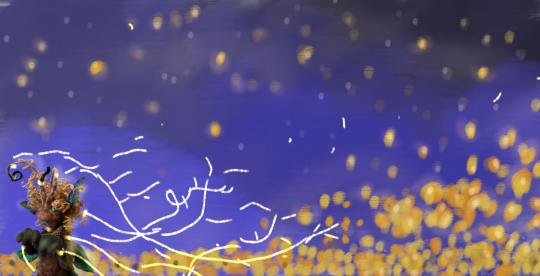
3 notes
·
View notes
Text
The Stars are Legion — you may have already read it, but if you’re looking for queer women in space with body horror this is the book. That’s the whole description.
These Fragile Graces, This Fugitive Heart — trans bisexaul woman in a corporate dystopia trying to solve a murder mystery. I would say there’s body horror this too, though its happening to side characters, not the main.
Mimicking of Known Successes — lesbian space romance — a detective trying to solve a murder gets a second chance with an old flame
These Burning Stars — how to describe this one. A cleric struggles with her role as an enforcer of empire as she and her sadistic former mentor race to catch a criminal who may or may not be involved in a scheme big enough to crumble worlds. There’s a subplot about a diaspora with a heavily Jewish bent. Excellent all around. A bit of body horror right at the end imo
The Practice, the Horizon, and the Chain — an allegory for racism set in space. Exquisite. Hands down the best thing I read in 2024. Short, painful, and lovely.
Empress of Salt and Fortune — first in a series of novellas about a monk who collects stories. Queer fantasy fun with a dark undertone.
The Manual of Detection — neither queer nor body horror, but does have trippy world building, if that’s what you’re after
The Adventures of Amina al-Sirafi — no body horror, some queer characters. A fast paced read about a retired private who gets dragged back into adventure against her better sense. It’s got sea monsters, queer pirates, mysteries, and no romance (which I appreciated).
Lady Eve’s Last Con — a con woman tries to get revenge on her sisters ex and ends up attracting the attention of the ex’s sister. Very roaring 1920’s in space with a hefty dose of romance, mystery/crime thriller feel.
The Tainted Cup — wildly cool world building. Queer characters, though their queerness doesn’t take up a lot of space in the story. A young man trying to move up the ranks of an oppressive military finds himself working for a deeply eccentric commanding officer tasked with solving a bizarre murder mystery. For me, there’s also some body horror in here. A lot of the world building revolves around modifying organic material, including human organic material.
Someone You Can Build a Nest In -- short, funny, and heartfelt. A queer romance with a side of monsterfucking where humans are the monsters
The Final Architecture -- series has body horror (you can't tell me Idris' story arc isn't all about body horror) and some of my favorite disabled characters in any sci fi series ever. There's a philosophical argument running through this book that value comes from usefulness and genetic diversity and disability valuable for their usefulness, which I don't love at all, but I do love the characters so much that it doesn't really matter. The series has a huge build up for a grant reveal in the finale and then sticks the landing, which is so rare! And also. Giant sentient divine clams, anyone? 10/10 for the clams alone.
I'm trying to make a list of 30 books to read in 2025, but alas......I've stalled at 9....
House of Leaves
The Wager
The Hammer
This Inevitable Ruin
Steering the Craft
Penric’s Demon
The Last Unicorn
The Golden Enclave
A Marvellous Light
#obviously most things by Octavia Butler too#i mean#she is the queen of dubious consent and body horror
2K notes
·
View notes
Text
Vaishali Made Music Academy: Reintroducing Ghazals Through Authentic Music Classes in Goregaon

In the heart of Goregaon, where high-rises meet heritage, one name is striking the perfect chord between tradition and modernity—Vaishali Made Music Academy. Known for its deep-rooted commitment to Indian musical culture, this academy is redefining the landscape of music classes in Goregaon by bringing back the elegance and emotion of Ghazals.
Far more than just a genre, Ghazals are a timeless artform—delicate, poetic, and powerful. And at a time when soulful music is fighting for space in the age of algorithm-driven playlists, Vaishali Made Music Academy is nurturing a generation of learners who don’t just sing Ghazals, but feel them in every breath.
Discovering the Soul of Ghazals – A Purpose Beyond Performance
Unlike mainstream songs that often prioritize rhythm over meaning, Ghazals are layered compositions of lyrical poetry set to melody. Each sher (couplet) in a Ghazal carries an emotion, a story, a philosophical undertone. Learning to perform a Ghazal is not just about training your vocal cords—it’s about understanding language, sentiment, and soul.
Vaishali Made Music Academy stands out because it recognizes this distinction. It’s one of the few music academies in Goregaon where Ghazals are taught with reverence, not rushed through. Here, every word is honored. Every note is nurtured.
Why Ghazals Deserve a Comeback – And Why You Should Be a Part of It
Ghazals have always held a mirror to the deepest parts of the human condition—longing, separation, love, pain, and self-reflection. But in recent years, they’ve been sidelined in popular culture. That’s why Vaishali Made Music Academy is leading a gentle revolution to restore Ghazals to their rightful place in our lives.
Here’s why learning Ghazals through music classes in Goregaon is more relevant than ever:
Mental calm and emotional expression in a chaotic world
Language and literary appreciation, especially of Urdu and Hindi poetry
Refined vocal training that builds control, pitch, and sensitivity
Connection to Indian classical music traditions that are often overlooked
At this academy, Ghazals are not treated like an optional module—they’re celebrated as a legacy.
Inside the Ghazal Course at Vaishali Made Music Academy
The Ghazal course is designed not as a series of lectures, but as a journey—one that helps students evolve as both singers and storytellers.
🔗 Explore the Ghazal Course
What You’ll Learn:
Stage 1: Grounding in Poetry & Language
Basics of Urdu and poetic form
Understanding rhyme schemes and structure
Emotional depth in lyrics
Stage 2: Vocal Technique & Expression
Breathing and projection
Techniques like murki, meend, and gamak
Building vocal stamina and range
Stage 3: Musicality & Melody
Introduction to raagas used in Ghazals
Training in taal and rhythm
Use of harmonium and tabla in accompaniment
Stage 4: Interpretation & Performance
Live practice sessions
Feedback and improvement techniques
Stage confidence and mic usage
The course is suitable for students of all ages and can be customized for absolute beginners or experienced vocalists looking to master Ghazal-specific skills.
Why Choose Vaishali Made Music Academy for Music Classes in Goregaon?
If you're searching for music classes in Goregaon, there are plenty of options. But few offer the depth, dedication, and emotional approach of Vaishali Made Music Academy.
Personalized Mentorship
Each student is seen, heard, and mentored according to their unique voice and pace.
Founder’s Legacy
Vaishali Made, a nationally acclaimed singer, leads the academy with personal involvement, ensuring that every course upholds the highest artistic standards.
Tranquil Learning Environment
Located in Harmony Mall, Goregaon West, the academy is peaceful and acoustically well-designed for musical immersion.
Flexible Learning Options
Students can choose between weekday, weekend, or hybrid (online + offline) classes that suit their schedule.
Passion-Driven Community
This isn’t just a school—it’s a community of artists who support and grow with each other.
What Students Gain Beyond Singing Skills
Training at Vaishali Made Music Academy enriches students not only musically but personally. Here’s how:
Deeper self-awareness through lyrical interpretation
Public speaking confidence by performing in small concerts
Better concentration and emotional regulation
Cultural appreciation and pride in Indian art forms
Whether you're pursuing music professionally or simply looking for soulful enrichment, this academy transforms how you experience music.
Other Courses Offered at Vaishali Made Music Academy
Aside from its signature Ghazal course, the academy also offers several other in-demand music classes in Goregaon:
Hindustani Classical Vocal
Bollywood Singing
Bhajan and Devotional Music
Voice Culture and Vocal Therapy
Light Music
Music Courses for Kids
Online Short-Term Programs
Each course is conducted by highly trained faculty members and follows structured curriculums infused with real-world musical applications.
How to Join – Admission, Address & Contact Details
Vaishali Made Music Academy Office No. 12 & 13, HDIL Harmony Mall, Link Road, Goregaon West, Mumbai – 400104 Phone: +91 8451837036 Email: [email protected] Website: https://vaishalimade.in Ghazal Course Info: https://vaishalimade.in/ghazal-course/ Get Directions: Google Maps Link
Enrollment is open year-round. Seats for each batch are limited to ensure personal attention.
Final Thoughts: A Place Where Ghazals Breathe Again
Vaishali Made Music Academy is not just teaching a musical style. It’s reviving a cultural treasure, helping students slow down and savor the richness of poetic music.
If you’re ready to find your voice—not just as a singer, but as a storyteller—this is where your journey begins. Whether you’re a curious beginner or a passionate vocalist looking to specialize, these are the music classes in Goregaon that will guide you back to the essence of Indian music.
Don’t just learn to sing. Learn to feel. Learn to express. Learn to live the Ghazal.
0 notes
Text
Eternals: The MCU’s Risky Love Letter to Humanity
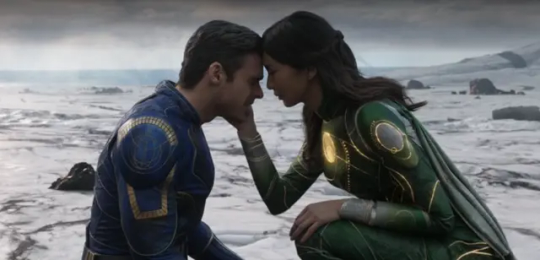
Marvel's underrated movie Eternals was actually good...Marvel's Eternals, with its sprawling narrative and massive ensemble cast, might have missed the mark for many, but if you give it a second chance, you might find yourself surprisingly drawn in. As Captain America: Brave New World brings the Celestial events from Eternals to the forefront of the MCU, it's time to revisit this often-dismissed movie and dig into why it worked for some of us. The film may have sparked debates, but its audacity and ambition deserve a deeper look. A Fresh Angle on the MCU
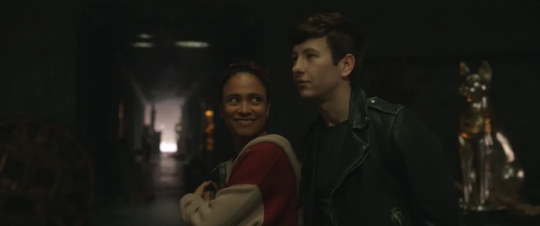
Eternals The MCU’s Risky Love Letter to Humanit (3) For those who skipped Eternals or rolled their eyes at its lofty concepts, here's a quick refresher: the story revolves around a group of seven superpowered beings, each bearing powers that echo ancient mythological figures. They've been on Earth for thousands of years, quietly following orders from their god-like leader to exterminate Deviants (think monstrous entities that threaten humanity). But after completing their mission, they’re left in limbo—waiting for a new directive that never comes. Fast-forward to 500 years later, and these ageless beings find themselves scattered across the world, with no sign of their next mission. When a new Deviant threat arises, the group must reunite, unravel the mysteries of their origins, and face shocking revelations that change everything. The premise alone is enough to spark intrigue, even for the most skeptical MCU fans. What stood out for me, though, was the film's exploration of humanity's legends and how they might have been shaped by these very beings. It’s not just the "aliens are behind all our myths" angle we saw in Thor. Instead, Eternals asks a bigger question: What if our greatest heroes of mythology were real—and they had been subtly influencing the course of history? This philosophical undertone adds weight to the film, offering something deeper than a traditional superhero flick.
Character A Marvel First?

Eternals The MCU’s Risky Love Letter to Humanit (2)
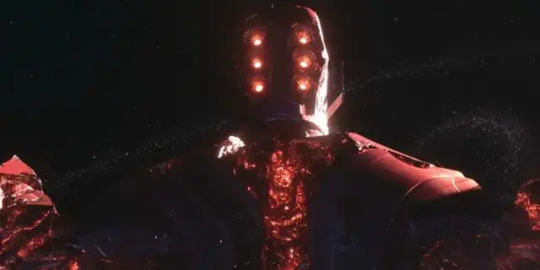
Eternals The MCU’s Risky Love Letter to Humanit (2)
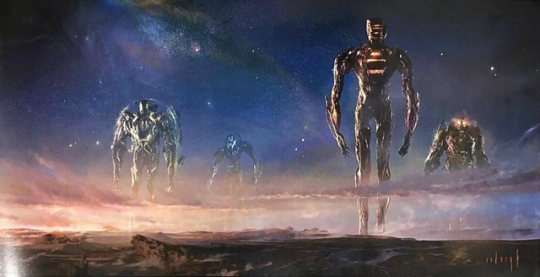
Eternals The MCU’s Risky Love Letter to Humanit (1) What truly elevates Eternals for me, though, is its character work. Unlike most MCU movies, where relationships often feel surface-level or exaggerated for comedic relief, Eternals takes its time to dig into its characters' pasts, motivations, and emotional complexities. This isn’t just another ensemble piece where quips and jokes make up for any meaningful connection. These are beings who have lived thousands of years together, and when they reunite, the emotional baggage is palpable. Let’s start with the leader of the group, Ajak (Salma Hayek). She embodies a calm strength that contrasts with the emotional turmoil brewing beneath the surface. But it’s her relationship with Thena (Angelina Jolie), once a fierce warrior now struggling with mental health, that provides some of the film’s most tender moments. Thena, driven by loyalty and guilt, is taken care of by Gilgamesh (Don Lee), who patiently watches over her, even when it means sacrificing his own needs. This is not the dynamic we often see in superhero teams, where characters simply get along because they have to. Druig (Barry Keoghan), who has grown disillusioned with humanity, has a fascinating arc, especially when paired with Makkari (Lauren Ridloff), a character who represents hope and optimism. Their relationship is electric—filled with tension and sweetness. Then there’s Ikaris (Richard Madden), who shares a tense, sometimes romantic connection with Sersi (Gemma Chan). The film’s emotional climax—a moment of raw vulnerability between these two characters—is one of the most genuine and heartbreaking scenes I’ve witnessed in a Marvel film. Richard Madden’s Ikaris, breaking down in tears, is a pivotal moment that showcases a depth we rarely see in MCU leading men. This is the real meat of Eternals—not the celestial battles or world-altering stakes, but the exploration of human (or alien) relationships. The film doesn’t just present characters as tools for a larger narrative; it asks us to care about their histories and, more importantly, their future. Every character has a different perspective on humanity, but they all share one thing: a deep-seated care for each other. It’s this connection—rooted in centuries of shared experiences—that anchors the film. The Risk of Emotional Investment The big risk Chloé Zhao took with Eternals is asking audiences to care deeply about characters who were entirely new to the MCU. After over a decade of established characters, it felt like a big ask. In a world where we’ve become accustomed to big set pieces and grand action sequences, Zhao’s quieter moments and slower pace may have felt like a departure from what we’ve come to expect from Marvel. And yet, I appreciated the gamble. Zhao challenges viewers to invest emotionally in these beings—not just as superheroes but as people with complex histories, personal traumas, and evolving understandings of themselves. She asks us to care about how they’ve changed over the millennia, and how their relationships have been shaped by time, trauma, and unfulfilled purpose. That’s not something we typically see in superhero movies. Sure, there’s a lot of exposition, but unlike other MCU films, where world-building is often done in quick, forgettable bursts, Eternals takes the time to craft these emotional moments. Even if they feel like a bit of a slow burn, they make the eventual payoff that much more rewarding. A Film of Messy, Beautiful Ideas Yes, Eternals is messy. The movie tries to juggle lofty themes about humanity, morality, and the very fabric of existence while still tying into the ever-expanding MCU. It's ambitious, and sometimes it stumbles. At times, the pacing can feel off, with too much time spent explaining the intricacies of their mission and too little focus on character development. And yes, there are plenty of moments where we find ourselves scratching our heads over choices made for the sake of the larger MCU plot. But in embracing its imperfections, Eternals becomes something more than a mere cog in the Marvel machine. It’s a deeply personal, character-driven exploration of what it means to exist, to love, and to reckon with the choices we make. What sets it apart from other Marvel films is that it asks us to care about the story itself, not just the broader universe. It’s a different kind of superhero movie—one where the stakes feel more personal, where the relationships are more complex, and where the heroes are flawed, vulnerable, and, at times, heartbreaking. The Long-Term Value of Eternals So, where does Eternals fit into the broader MCU? It’s tempting to place it as a standalone, a forgotten chapter in the franchise’s larger narrative, but I think it’s a movie that will resonate more as the MCU continues to evolve. The events of Eternals are far from finished, and the celestial implications that were barely touched upon in this movie will no doubt play a larger role in future installments. In some ways, Eternals feels like a love letter to the concept of immortality—not just in the sense of living forever but in the impact of our actions, relationships, and legacies. These characters, while immortal, are grappling with the weight of their existence, and their stories will continue to unfold. It's not about the action set pieces or the flashy effects, but about the quiet moments of introspection that make Eternals a hidden gem in the MCU. By the end of the film, I realized that Eternals isn't just about superpowered aliens saving the world. It's about understanding what it means to care, to love, and to sacrifice. It's a complex, messy, beautiful film that might not have won over everyone, but it certainly found a place in my heart. And sometimes, that's all a movie really needs to do. Conclusion: A Love That Deserves to Be Seen Perhaps Eternals isn't for everyone. It’s a long movie, filled with questions of fate, morality, and sacrifice. But if you can embrace its slow pace and take the time to get to know these characters, you’ll find that the movie offers something unique in the MCU—a deep dive into emotional storytelling and complex character relationships. It’s a reminder that even in a universe filled with world-ending threats and epic battles, the true heart of any story lies in the connections between people. Eternals may not be the MCU's best movie, but it certainly deserves more love than it's gotten. So, give it a second chance—and maybe, like me, you’ll find yourself caring more than you thought possible. Read the full article
0 notes
Text
Defining dark academia.. Merely an aesthetic? A movement of neo-aestheticism aching for educational equity and the pining of the second enlightenment.
By all means and measures.. I doubt that I am necessarily able to meld philosophic intentions with what I have understood of reading some texts to come out of this trend but I wanted to see what peoples thought were on it. I feel there are two kinds of reasons we read, for the escape and for deep consideration. In my little life, I feel there are many that see novels as little less than for it's vivid prose than it's deeper intentions and questions. Once books were an invite to consider the world more deeply and fantastical, fictional realms were outcries that touched the tender hearts of humans to inspire change... In the current circumstance, I wonder how many people consider books in such a light- and I think this is where I feel at odds with dark academia. Or rather with certain stories that are attributed to it. In western fiction is notable that every literary age (romanticism, absurdism, modernism etc.) were a neater snapshot of the times and feelings at play. 'Frankenstein' by Mary Shelley as contemplation of the rise of feminism and of the intermingling of nature with industrial movements with an ending that drives a need to reconcile our own position in both. Or for example, 'Waiting for Godot' by Samuel Beckett, where two men wait in the middle nowhere for someone to finally come along, was written post World War 1. Bloody as many wars were, it is in fiction that we find the awareness of the undeniable horror of it in the eyes of its soldiers and shambling families along with human hope and progress for the better. There's modernism too, the likes of T.S Elliot etc. And there's us in the present. There is a love to be found in the aesthetics we craft in this time of post modernism. A yearning to be more and or to be away from the confines of grey cities, trains and bills. To have our feet in the yellow sands of a coastal area, hair brushed by the tender hand of the wind and the skies a mottled blue as they meet with the sea as you cast your gaze to the sea. A mottled blue and not a plain blue because I prefer tactile drumming of the rain. In this, I believe that our redefinition of aesthetics to be more of a vibe- this neo-aestheticism is a symptom of escapism. And it is in this that I can't help but feel that works born in these aesthetics are different to these literary ages in a sad fundamental way. Where is our change? Dark academia is defined by a venture into the intellectual realm, one associated with extravagance, undertones of elitism and enlightenment. In the convergence of knowledge, there is madness and suffering in its pursuit. 'The secret history' by Donna Tartt covers such notions although I wonder if in the post modernist era- the lack of urgence to do something about our current circumstance is lacking. Written in light of American schools with the lingering ideology of British universities and education being less and less of a manner than individual growth than how one makes best use of a system that demands it's cogs... It's resurgence and popularity in 2020 makes me feel ill-giving towards educational systems that fail to first and foremost nature a generation that cares for its world.. I don't exactly know what to really ask opinions on. But I wonder how other people feel about all of this?
1 note
·
View note
Text
The Harmonious Divergence: Classical Indian Dance Classes vs. Modern Dance Classes
Dance is a universal language that transcends cultural and linguistic boundaries. Within this realm, classical Indian dance classes near me and modern dance represent two distinct yet harmonious worlds. Both forms have their unique styles, histories, and philosophies. Let’s explore the differences between classical Indian dance classes and modern dance classes.
Origins and Evolution
Classical Indian Dance:
Classical Indian dance forms, such as Bharatanatyam classes, Kathak, Odissi, and Kuchipudi, trace their roots back thousands of years. These dances are deeply intertwined with Indian mythology, religious rituals, and temple traditions. Each classical indian dance class form has a rich history and follows specific guidelines and structures passed down through generations. The Natya Shastra, an ancient Indian treatise on the performing arts, lays the foundation for many of these dances.
Modern Dance:
Modern dance emerged in the early 20th century as a rebellion against the rigid structures of classical ballet. Pioneers like Isadora Duncan and Martha Graham sought to express more personal and emotional content through dance. Modern dance is characterized by its fluidity, freedom, and emphasis on the individual dancer's expression. It often incorporates elements from various dance styles and is continually evolving.
Training and Techniques
Classical Indian Dance Classes:
Rigorous Training: Students undergo years of rigorous training, mastering complex footwork, intricate hand gestures (mudras), facial expressions (abhinaya), and body postures. bharatanatyam dance classes near me .
Structured Curriculum: The curriculum is highly structured, with a strong emphasis on technical proficiency, storytelling, and adherence to traditional compositions.
Guru-Shishya Tradition: The teacher-student relationship is deeply revered, often following the ancient Guru-Shishya (teacher-disciple) tradition where the teacher imparts not just technical knowledge but also spiritual and moral guidance.
Modern Dance Classes:
Flexibility and Creativity: Modern Indian dance class encourage creativity, improvisation, and individual expression. There is no strict adherence to a fixed set of movements or techniques.
Eclectic Approach: The training often incorporates elements from various dance forms, including jazz, contemporary, hip-hop, and even classical ballet, providing a diverse learning experience.
Personal Interpretation: Dancers are encouraged to explore and interpret movements in their unique way, often leading to innovative and experimental performances.
Themes and Expression
Classical Indian Dance:
Mythology and Spirituality: Themes often revolve around stories from Indian epics like the Ramayana and Mahabharata, as well as religious and spiritual concepts.
Symbolism: Each gesture, expression, and movement holds deep symbolic meaning, conveying specific emotions, narratives, and philosophical ideas.
Devotional Aspect: Many classical Indian dance classes near me are performed as offerings to deities, with a strong devotional and spiritual undertone.
Modern Dance:
Contemporary Issues: Modern dance often addresses contemporary social, political, and personal issues, making it a powerful medium for commentary and reflection.
Emotional Expression: The focus is on raw, authentic emotional expression, often pushing boundaries and challenging traditional norms.
Abstract and Conceptual: Modern dance can be abstract, exploring movement and form without a specific narrative, allowing for open interpretation by the audience.
Performance and Presentation
Classical Indian Dance:
Traditional Attire: Dancers wear elaborate, traditional costumes, jewelry, and makeup, each element enhancing the storytelling aspect of the performance.
Live Music: Performances are often accompanied by live music, including classical Indian instruments like the mridangam, veena, and flute, with vocalists singing traditional compositions.
Stage Conventions: The presentation follows specific stage conventions and sequences, creating a structured and predictable format.
Modern Dance:
Minimalist Approach: Costumes and stage settings can range from elaborate to minimalist, depending on the choreographer’s vision.
Varied Music: Music selection is eclectic, spanning genres from classical to contemporary, electronic to experimental.
Innovative Staging: Performances may take place in unconventional settings, incorporating multimedia elements, lighting effects, and audience interaction.
Conclusion
Both classical Indian dance and modern dance offer rich, immersive experiences, each in its unique way. While classical Indian dance connects us to ancient traditions, cultural heritage, and spiritual narratives, modern dance provides a canvas for contemporary expression, innovation, and personal storytelling. The beauty of dance lies in its diversity, and exploring both forms can lead to a deeper appreciation of the art and its boundless possibilities.
Whether you are drawn to the intricate rhythms of Bharatanatyam or the expressive freedom of modern dance, each path offers a journey of discovery, discipline, and joy.
#bharatanatyamclassesnearme#bharatanatyamdanceclassesnearme#indiandanceclass#bharatnatyamclasses#classicalindiandanceclassesnearme#indianclassicaldanceclassesnearme#onlinebharatanatyamclasses
0 notes